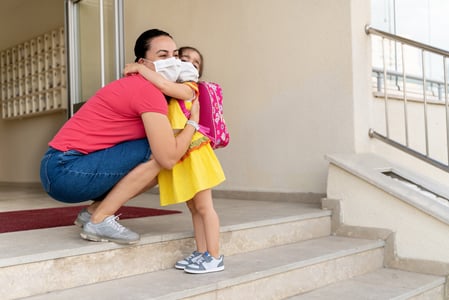
By the end of every summer, the education world erupts with talk about back-to-school. This year was no different. The air was full of optimism. Vaccines had rolled out, many of us took our first vacation in a year and a half, and my inbox was full of the “best back to school” sales. Sadly, as quickly as many schools welcomed children back into the classroom with open arms, they were forced to close again due to increases in COVID-19 infections.
Admins, teachers, students, and families alike may be feeling concerned, cautiously optimistic, pessimistic, or confused. If you’re like me, you might feel all of the above all at once. But, I am taking comfort in knowing that this year, we are armed with more data.
We’ve been through this before. We’ve learned a lot, and collectively, we’re more prepared.
That said, it’s important to keep this back-to-school season in perspective. There are some key learnings to help you, your staff and students feel welcome and safe even in the midst of uncertainty.
Acknowledge Trauma
We all experienced trauma. Remember to be patient and supportive of teachers, students, and families. Everyone processes differently.
For teachers, this may mean seeing increases in challenging behaviors in your classroom. Let’s shift our perspective from asking, “what’s wrong with the child?” to “what happened to this child?” Learn how to appropriately respond to their behavior and support their well-being in our webinar series developed with thought leaders across the industry.
For programs or educators who may want even more in-depth trauma-informed professional development, Teachstone offers additional support with Interactions at the Heart of Healing which we developed last summer. These trainings include options for on-demand sessions or live group trainings, and are offered in English or Spanish.
Allow for Openness and Change
Plans may need to shift. Be as transparent as you can about changes, and give your community (staff and families) time to adjust to the news. Even more importantly, provide avenues for feedback. A program that welcomes feedback and data, is one that is more open to change.
Continue building on that openness to create a culture of continuous quality improvement (CQI). In order to connect with children and make a meaningful impact, teachers need to feel they have ownership and opportunities to evolve their practice. Unpack specific strategies to drive CQI during our upcoming webinar.
Provide a Space to Connect
You, your teachers, and instructional coaches may all feel isolated or have trouble finding joy during a stressful back to school season. Provide ample opportunities for your team to connect with each other, or with other educators facing similar challenges. Teachstone’s CLASS Learning Community is our network for educators to share tips and ask questions. If you don’t already have access, you can join for free here.
Another platform for teachers to connect with each other and get additional support is through our virtual teacher series, Back to School with Meaningful Interactions. From September 13-17, 2021 for 45-minutes each day, we’re hosting inspiring sessions with strategies that support great teaching practice (session are in English and Spanish). Teachers will have the opportunity to chat with our live presenters to get tips for their specific challenges. It’s an opportunity to prepare for the new school year with brief sessions demonstrating tactics you can immediately apply to build stronger, more equitable relationships in your classroom.
Celebrate the Wins
Finally, and most importantly, don’t forget to celebrate the successes that are happening. I am continually amazed by all the creative, impactful, and effective strategies that teachers have implemented. Educators have had to be more flexible than ever. Recognize and reward their efforts! We recently heard from hundreds of teachers about the accomplishments they’re most proud of, and we encourage you to celebrate great teaching as well.
So, while this back to school season didn’t pan out to be as “normal” as some had hoped, we can move forward feeling more prepared. Let’s continue to listen to and support each other.
